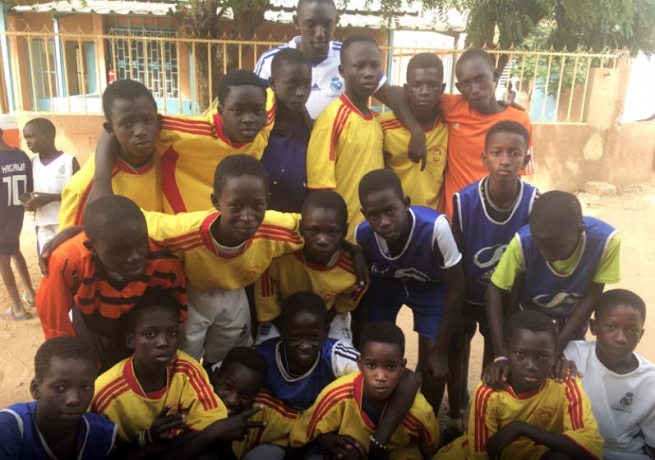SENEGAL: More than 300 youth participate in socio-sports schools

More than 300 youth participate in socio-sports schools launched by Real Madrid Foundation and the Salesian Mission office in Madrid
(MissionNewswire) More than 300 youth, ages 5-17, play sports and learn values thanks to the two socio-sports schools the Real Madrid Foundation set up in Senegal with the collaboration of the Salesian Mission office in Madrid, Spain. The programs are hosted at Salesian schools in Thies and Tambacounda. Most of the project’s participants come from local Salesian centers.
The partnership between the Real Madrid Foundation and the Salesians began in 2010 in Senegal and continued to schools in Central and South America. The first social-sports school was in Rio de Janeiro, Brazil. In 2012, social-sports schools opened in Portugal. Today, the collaboration has 21 projects in 14 countries and serves nearly 4,000 children each season, using educational sport and its values as a catalyst for the social betterment of youth and communities.
Both the Real Madrid Foundation and the Salesians are aware that sports are important for social integration and the promotion of values like teamwork, communication, respect and team spirit. The social-sports schools are housed in Salesian schools. As part of the Real Madrid Foundation’s “They play, we educate” program, participants receive nutrition, family and psychological support, regular health checkups, the opportunity to participate in social and educational workshops, gymnastics, crafts and reading, and citizenship activities. Training sessions on topics such as health, hygiene, values, and the prevention of alcohol, tobacco, and drug abuse are also provided.
“Sports programs teach youth both on and off the field,” said Father Gus Baek, director of Salesian Missions, the U.S. development arm of the Salesians of Don Bosco. “Learning and playing team sports encourage leadership skills as well as teach youth to work as part of a team. Students also learn important social skills and have opportunities for growth and maturity.”
In Thies, Salesians have 180 youth participants while in Tambacounda, there are 135. Twice a week, youth attend sports training sessions. On the other days, youth are engaged in educational lessons, extra sporting activities, and sessions that aim to foster good eating and hygiene habits. The pandemic changed and limited how much youth were able to engage in regular schooling and sports.
A coach with the program said, “During confinement, the children asked us for activities to do at home, and we noticed that they became more supportive and responsible. They listened to the outreach talks and the educational reinforcement paid off. They also offered to take care of the cleaning of the sports fields at the end of the mandatory quarantine period.”
Located on the west coast of Africa, Senegal has nearly half its population living in poverty. Crop failures due to extreme weather have impacted the economy, and a recent ban on street beggars has taken the only source of income away from many families. A report by the Chronic Poverty Research Center found that not only are 60 percent of households labeled “poor or vulnerable” but there is a possibility that the poverty will be passed on to the next generation. A sign of hope in the country is the steadily increasing percentage of children enrolled in primary school, which according to the World Bank has reached 86 percent.
###
Sources:
ANS Photo (usage permissions and guidelines must be requested from ANS)
Salesian Missions – Senegal
World Bank – Senegal





